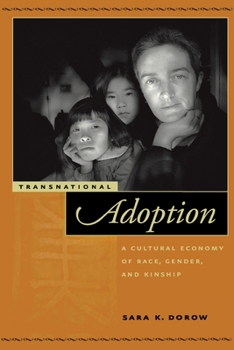Transnational Adoption: A Cultural Economy of Race, Gender, and Kinship
(Part of the Nation of Nations: Immigrant History as American History Series)
Select Format
Select Condition 
Book Overview
Each year, thousands of Chinese children, primarily abandoned infant girls, are adopted by Americans. Yet we know very little about the local and transnational processes that characterize this new migration.
Transnational Adoption is a unique ethnographic study of China/U.S. adoption, the largest contemporary intercountry adoption program. Sara K. Dorow begins by situating the popularity of the China/U.S. adoption process within a broader history of immigration and adoption. She then follows the path of the adoption process: the institutions and bureaucracies in both China and the United States that prepare children and parents for each other; the stories and practices that legitimate them coming together as transnational families; the strains placed upon our common notions of what motherhood means; and ways in which parents then construct the cultural and racial identities of adopted children.
Based on rich ethnographic evidence, including interviews with and observation of people on both sides of the Pacific--from orphanages, government officials, and adoption agencies to advocacy groups and adoptive families themselves--this is a fascinating look at the latest chapter in Chinese-American migration.






